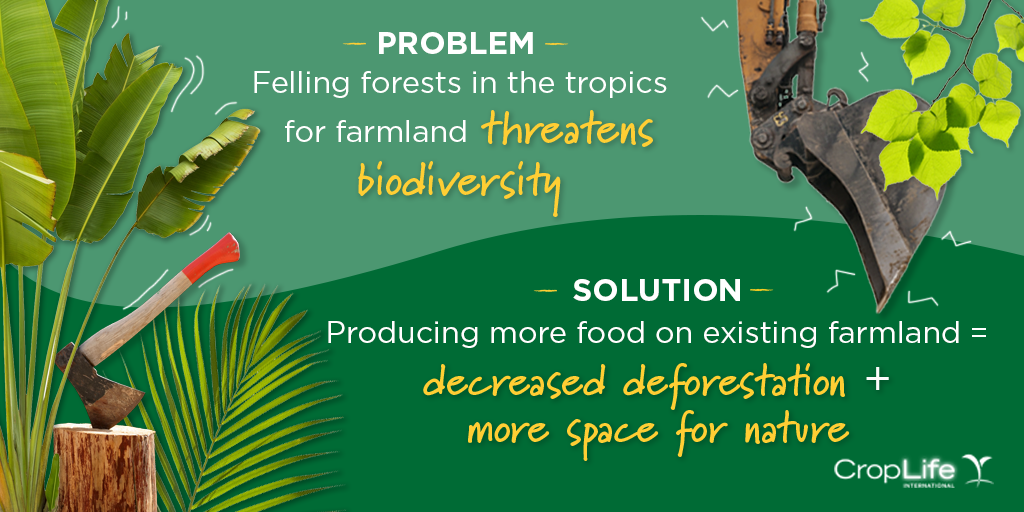By: CropLife International
Take this quiz to test your knowledge on climate change and agriculture! Click here.
By: CropLife International
Take this quiz to test your knowledge on climate change and agriculture! Click here.

By: CropLife International
According to a recent study, as global temperatures go up, so will insect populations. These “creepy-crawlies” eat crops meant for human consumption and cause a host of other problems for farmers. Check out what could happen from more climate change:

With access to crop protection and plant biotechnology as part of an Integrated Pest Management strategy, farmers can beat the bugs.
By: CropLife International
Climate change can cause a host of problems for farmers including flooding, excessive heat, and drought. See how innovative technology and the right tools allow farmers to continue producing despite these changes:
To learn more about how climate change impacts agriculture here.
Farmers can help increase biodiversity in a number of ways and a rich diverse environment helps farmers too! Check out our infographic below to learn about the top five.

“We’ve shifted away from generations that were focused on food, that’s not their primary focus. People today care about the environment.” Paul Temple, is a third generation beef and arable farmer in Yorkshire. Running a family farm, legacy is extremely important to Paul, and he is always on the lookout for ways to make his farm more sustainable.
In the following video Paul talks about how the grassland margins on his farm give bees a place to forage and have helped to bring other species back to the area.
In the EU, farmers must maintain a 2-meter margin alongside their hedges. In Paul’s case this left him with a grass margin around all his fields. This might seem like quite a lot of land to go unfarmed, but what Paul found was that these margins have been extremely beneficial for the local wildlife.
“If you leave these grass margins, you get a lot more small mammals there. Two or three years after these have been established then you’ll get owls and other small mammal predators,” he explained.
Paul joined a high-level environmental scheme that increases these margins up to 10m. More used to farming crops, Paul found this to be a slow learning curve. “The tricky bit is you get one cycle a year. We’re eight years into our environmental scheme so I’ve only got eight years or eight cycles of experience.”
However, over time experimenting with different flowering mixes within his margins, and learning when to cut and manage this land, has helped Paul to make these areas more effective: “we are now finding owls back in the area that we never had when I was a child.”
Paul also follows Integrated Pest Management practices on his farm. You can learn more about what he does on his farm in our Crop Protector video series.
 We spoke with Jake Freestone, a Crop Protector and UK farmer about some of the ways he is maximizing biodiversity on his farm.
We spoke with Jake Freestone, a Crop Protector and UK farmer about some of the ways he is maximizing biodiversity on his farm.
Why is biodiversity important on a farm?
Biodiversity underpins all of our food and ecosystems. The environment is so crucial to making food production run as smoothly as possible. Whether support that is helping bees to pollinate crops or helping to clean the water as it goes through the farming system, a biodiverse environment makes everything run smoothly.
Have you seen a species return to your farm because you are mindful about biodiversity?
We are finding more beetles and more earthworms in our soil. We started doing no-till in 2016, and within two years we started to get an increase in Rose Beetles and another beetle called a Devil’s Coachman. They are natural predators of slugs—one of our big problems here in the UK. By leaving plant residue, you promote a good habitat for the beetles.
Jake Freestone speaks about managing slugs
Also earthworms, we have fields with earthworm castings all over them and to me that is a really easy win for farmers. The more worms the merrier and if my earthworms are good in number, then I am confident that the things that we can’t measure or see with the naked eye are also in good health.
What about diversity within the crops themselves?
We try not to just keep biodiversity on the margins but integrate it into the actual cash crop we grow. For instance, in our oilseed rape, we grow vetches, buckwheat, and clover to act as companion crops within those fields. We think they can mask the emerging oilseed rape crops from flea beetle. They are leguminous and provide a degree of nitrogen while helping cover the field to reduce bird damage. They suppress weeds which saves on herbicides and gives us a net financial benefit of about $45 USD per hectare.
Can you tell me more about Linking Environment and Farming – the organization that promotes sustainable farming?
Some farming friends suggested it to me. They said LEAF is on the cutting edge of environmental sustainability, where they look to reduce the impact on ecology and biodiversity while still remaining focused on outputs.
LEAF has a helpful Integrated Farm Management handbook and they run a great event called Open Farm Sunday where as many farms as possible open their gates on the same day. We welcome the general public and our customers so they can see how we grow the food and look after the environment.
At a LEAF meeting the farmers are really positive people. We ask ourselves about the wider benefits to society and the environment from what we do on the farm and you always learn something when you go to one of those meetings.
What has been something that you have picked up on in one of those meetings that you have implemented in your farm?
We deepened and widened a stretch of ditch to create a silt trap and a little reed bed as well. Now we have reeds growing filtering the water and when you go down there, there are little birds, little wrens and threshes and all sorts of stuff making that their environment and their home now.
Can using pesticides help with biodiversity?
We have to be responsible and make sure to stick to the label. We need to have buffer strips around our fields and use the right product at the right time, with the right dose.
We used to use seed treatment to control cabbage stem flea beetle. Without that [now banned treatment] farmers now spray broad acre insecticide across the emerging crop to prevent damage. Unfortunately, there are huge losses from resistance and over the span of three days, the pest virtually wiped out my whole crop of oilseed rape in three fields. It was that quick and that invasive.
Plant science can offer solutions to many problems that threaten global biodiversity like deforestation, climate change and drought. Check out the facts:








Brussels — 5 November 2018
CropLife International welcomes the joint International Statement on Agricultural Applications of Precision Biotechnology, endorsed by 14 governments and regional bodies, released at the World Trade Organization (WTO) Committee on the Application of Sanitary and Phytosanitary Measures, which shows their support for precision biotechnology and gene editing. The plant science industry applauds these governments for their commitment to science- and risk-based and harmonized regulatory approaches and to working collaboratively to minimize trade disruptions. CropLife International encourages additional governments to endorse this statement in support of science and agricultural innovation.
“The plant science industry commends those governments, across developed and developing countries, for endorsing the International Statement on Agricultural Applications of Precision Biotechnology and their commitment to science-based, innovation-enabling regulatory frameworks,” said Howard Minigh, president and CEO of CropLife International. “A globally harmonized approach to precision biotechnology will ensure the timely and predictable introduction of safe and sustainable agricultural products to the marketplace, while minimizing trade disruptions.”
Precision biotechnology, including gene editing, is another tool that will further enable plant breeders to address global challenges such as food and nutrition security, help farmers adapt to and mitigate climate change conditions, and protect the environment, natural resources, and biodiversity.
“We support these 14 governments and regional bodies in this call to work together to ensure agricultural innovation reaches farmers and consumers,” said Minigh. “Today’s farmers worldwide need access to many different technologies and plant breeding tools to help feed our growing population in a sustainable way.”
Countries and organizations supporting the statement, to date, are: Argentina, which led this effort, as well as Australia, Brazil, Canada, Colombia, the Dominican Republic, Guatemala, Honduras, Jordan, Paraguay, the United States, Uruguay, Vietnam and the Secretariat of the Economic Community of West African States.
# # #
By: CropLife International
Brought together by plant breeding, agricultural biotechnology, and their shared goal to end malnutrition, The Nutritious Nine are a biofortified team of crops from all over the world whose powers come together to fight preventable vitamin deficiencies and other health problems.

Biofortified superheroes
Click here to see their stats and superpowers and learn about how all nine of them can help people every day.